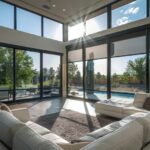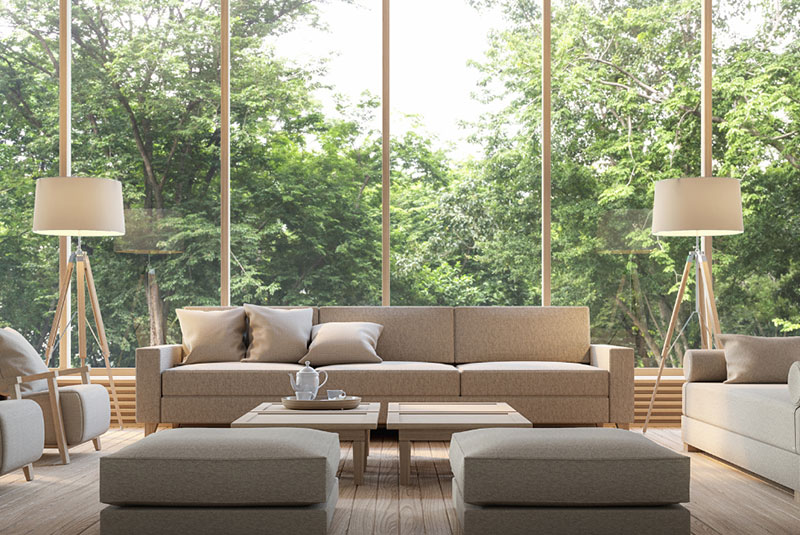
The Ultimate Guide to UV-Blocking Home Window Tinting
September 1, 2025
The Essential Benefits of Home Window Tinting
January 6, 2026Window Tinting FAQs: Answers for Homes and Businesses

Window film and window tinting offer versatile solutions for enhancing comfort, privacy, and energy efficiency in both residential and commercial spaces. We have compiled a comprehensive list of the most frequently asked questions, or FAQs, about window tinting and window films. We cover everything from benefits and installation to maintenance and cost, and help you make informed decisions for home or business window film projects.
Table of contents
- 1. What is window film? And, what film options are available?
- 2. What are the main benefits of 3M residential and commercial window films?
- 3. What’s the difference between residential and commercial window tinting?
- 4. Where is the window film applied — interior or exterior of the glass?
- 5. How long do window film installations take?
- 6. Does window film change the appearance of my windows?
- 7. Will the film make my room/window dark or limit natural light too much?
- 8. How factors impact the cost of window film installations?
- 9. How long does window film typically last?
- 10. How do I maintain / clean the new tinted windows?
- 11. Can old film be left on when installing new film?
- 12. Will window films reduce the risk of the glass breaking?
- 13. What code or regulation concerns should I keep in mind when selecting tinted window film product?
- 14. Are there limitations to adding window film to my home or building?
- 15. How do I choose the “right” film for my project?
- 16. What are the common misconceptions I should know about?
- 17. What should I expect during the installation process?
- 18. What are some potential drawbacks or limitations?
- 19. Are there incentives, rebates or energy certifications associated with window tinting?
- 20. How soon will my investment pay off (return on investment)?
1. What is window film? And, what film options are available?
Window film refers to applying a thin, multi-layered polyester film to glass surfaces. Based on your needs, window films typically fall into three categories: solar (tinting), decorative, and security.
- Solar window films or window tinting, features UV protection, temperature control (summer heat vs. winter cold), and utility savings.
- Decorative window films come in a wide variety of patterns which can be used for privacy, aesthetics, and business storefront branding.
- Security window films add an extra level of safety to your windows to reduce injury due to breaking glass, prevents smash and grabs, and reduces interior visibility to deter break-ins.
2. What are the main benefits of 3M residential and commercial window films?
- Reduced solar heat gain = lower cooling load/utility bills.
- Blocking up to ~99% of harmful UV rays, helping protect furnishings, flooring, artwork from fading.
- Reducing glare on screens or workspaces (especially in offices).
- Added privacy or one-way mirror effect (for homes or storefronts/offices).
- Enhanced safety/securing glass (some films help hold shards together, slow breakage).
3. What’s the difference between residential and commercial window tinting?
- Purpose & focus: For homes, comfort, protection of interiors, aesthetics tend to dominate. For commercial buildings, energy efficiency, large-scale cost savings, privacy/security, branding may be more significant.
- Types of film used & scale: Commercial projects often use more heavy-duty or specialized films (reflective, anti-graffiti, security) and may require large logistics, lifts, scheduling outside business hours. Homes generally smaller scale, simpler access.
- Cost & return on investment: Because commercial buildings have more glass and higher cooling/heating loads, the ROI from tinting may be faster and more measurable. Homes still get benefits, but scale is smaller.
- Installation complexity: Commercial may involve high-rise windows, large panels, or special coatings; residential usually straightforward.
4. Where is the window film applied — interior or exterior of the glass?
For most interior installations (both residential and commercial) the film is applied to the inside surface of the glass. Exterior film is available but is usually for larger commercial buildings with specific concerns or needs.
5. How long do window film installations take?
The time varies based on number of windows, size, accessibility, whether existing film must be removed, and whether scaffolding is required. For residential jobs, it might be a few hours/half day; for commercial, potentially multiple days.
6. Does window film change the appearance of my windows?
- It depends based on the selected window film. Solar/reflective films may have a slightly mirrored or tinted appearance; decorative films may be frosted, patterned, or opaque.
- However, there are barely-visible residential films designed to minimize visual impact while preserving the many window film benefits, which can be especially important if you have a Homeowners Association.
Take a look at some of our window tinting projects on our Gallery page.
7. Will the film make my room/window dark or limit natural light too much?
- Depends on the film’s visible light transmission (VLT) rating - Lower VLT = darker appearance, higher VLT = more light passes. Request sample window film swatches to understand the unique effect on your space.
- Many residential films are selected to balance comfort + light, not necessarily to make the room feel dark. While businesses may chose a slightly darker window film to obtain greater solar, heat, and UV performance.
Read more about window film in our window film industry standards.
8. How factors impact the cost of window film installations?
- The cost heavily depends on the size & number of windows, the type/grade of film, accessibility of installation, whether old film must be removed, and special features (security, anti-graffiti).
- Residential applications typically cost less than commercial applications, but always get a detailed estimate.
9. How long does window film typically last?
Lifespan depends on quality of film, exposure (sun/direction), and proper installation. Some solar films have 10-15 year limited manufacture warranty, especially for commercial window films. Exterior installations may have shorter warranty period due to harsher conditions. UHS provides a Lifetime Residential Warranty and 10-Year Commercial Warranty.
10. How do I maintain / clean the new tinted windows?
- After installation, there is a curing/drying phase during which there may be small bubbles or haziness — this is normal; we recommend waiting some days (or up to 30-60 days) before performing any heavy cleaning.
- Always use non-abrasive cleaning materials, ammonia-free window cleaner (especially for tinted film). Avoid scrapers, blades, rough pads.
- For commercial high-traffic or exterior film, cleaning may need to be more frequent.
11. Can old film be left on when installing new film?
- No — old film often needs to be professionally removed before the new film is applied. Applying new film on top of old can cause issues (adhesion, bubbling, warranty problems).
12. Will window films reduce the risk of the glass breaking?
- While standard solar film is not designed primarily for structural reinforcement, many films do add some shatter-resistance: they help hold glass fragments together if broken.
- If safety or security is the key goal (storm protection, smash-and-grab, etc.), then security window film is usually recommended.
13. What code or regulation concerns should I keep in mind when selecting tinted window film product?
- For most residential and commercial applications, building codes, energy codes, or glazing regulations may apply (e.g., solar heat gain coefficient, visible light transmission). It’s wise to check local building code requirements. Especially for commercial storefronts or offices, film applied to storefront glass may need to comply with specific safety glazing impact requirements.
- Some Homeowners Association contracts may specifically state that you are not allowed to change the exterior of the home without prior approval. Check your contract.
14. Are there limitations to adding window film to my home or building?
- Glass Texture: Most film is designed to adhere to standard smooth glass. Adhesion and performance may differ for special glazing, textured glass, or decorative glass.
- Window Types: Applications to special windows like insulated/dual-pane, heat‐strengthened, or tempered glass can potentially be a limitation. It is best to consult a certified professional window film installation company to be sure of potential limitations.
- Commercial Budget and ROI: For exterior film or high rises, additional safety equipment, lifts, or special films may be required and may cost more.
15. How do I choose the “right” film for my project?
- Define your goals: comfort, energy savings, UV/fade protection, privacy, security, and appearance.
- Consider window orientation (east/west/south exposures), size of glass, sun patterns, and whether the building/room has special needs (e.g., storefront, display windows, conference room).
- Determine aesthetic preferences: Do you want a near-invisible film, a slight tint, a reflective look, or a decorative pattern?
- Expected ROI, especially for commercial applications, the energy savings and maintenance savings may offset cost.
- Experts help you evaluate your unique goals and environment including the desired outcome, condition of the existing glass, whether removal of old film is needed, accessibility issues, etc.
- Ask a professional installer to provide sample swatches to help you visualize options.
- And, lastly, don't forget to ask about installer warranties, window film brands (quality), & maintenance guidance.
16. What are the common misconceptions I should know about?
- “It will make my home dark like a tinted car window” — Answer: Not necessarily; there are films designed to maintain natural light while reducing heat/UV.
- “Film blocks heat completely” — Answer: While good films significantly reduce solar heat gain or UV, no film is a 100% barrier, and performance will vary. Example: some solar films may reduce heat up to ~63% in some commercial cases.
- “All films are the same” — Answer: Quality, manufacturer, adhesive, durability, warranty, and installation matter a lot. Cheap film often fails prematurely, discolors, bubbles, etc.
- “Once installed I don’t need to do anything” — Answer: It’s true that maintenance is low, but cleaning properly, monitoring for damage, and knowing the warranty conditions are still important.
- “I don’t need an installer; I can DIY” — Answer: For small simple jobs maybe, but professional installation improves longevity, aesthetics, and helps avoid issues (bubbling, peeling, warranty voids). Also large commercial jobs may be unsafe to DIY.
17. What should I expect during the installation process?
- Pre-installation: Glass surfaces will be cleaned, prepped, and if old film exists, removed (if applicable).
- Installation: Film is cut to size, applied with a water/soap solution, squeegeed to remove bubbles and water, trimmed. Installer will maintain protection of interior furnishings/floor.
- Post-installation curing: Some films may show trapped moisture or small bubbles initially — this is normal and may take up to ~60 days to fully dry out in some cases.
- Care instructions: Homeowners and Businessowners should avoid cleaning aggressively for a set period (often a week or more), avoid tapes or adhesives applied over the film, be cautious with shelving or install work near the window etc.
Learn about the IWFA Window Film Industry Standards for window film installations.
18. What are some potential drawbacks or limitations?
- Installation Cost: Large glass expanses, high rises, exterior access, and other factors can increase the cost.
- Visual alteration: Depending on film type, the appearance may change (slight tint, reflection) which may not suit all tastes.
- Using Cheap Films: Using cheap window film will cause issues like bubbling, peeling, discoloration.
- Interior Dimmer: Some films are darker than others and may reduce the amount of light more than desired, potentially making interiors feel slightly dimmer.
- Exterior Changes: Some very high-performance films may make exterior views slightly different (more mirror-like) in certain lighting.
- Structural Safety: For very large or structural glass, safety window film may not be a substitute for required local safety standards structural glazing or tempered glass — window film is a supplement, not always a replacement. Check your local building codes.
19. Are there incentives, rebates or energy certifications associated with window tinting?
- For commercial installations, you may qualify for utility rebates or energy-efficiency incentives like earning points toward LEED certification by installing solar film.
- For residential, local utility companies or state energy programs may offer incentives for reducing cooling/heating loads. Read about how utility companies are providing rebates.
Visit the N.C. State University's Georgia Programs page to research potential options.
20. How soon will my investment pay off (return on investment)?
- For a home: ROI is less dramatic than large commercial buildings, but comfort, UV protection and reduced fading of furnishings are meaningful benefits.
- For a commercial building: With larger glass area and higher HVAC/energy costs, savings from reduced heat load, glare, improved occupant comfort and possibly reduced maintenance can lead to relatively fast payback (depending on building specifics).
Didn’t find the answer you were looking for?
Give us a call at (678) 648-2494 and we will be happy to answer any of your questions.
Ready to get started on your project?
Complete the Free Quote Form on our contact page and we will reach out to you for a good time to visit your home or business.











